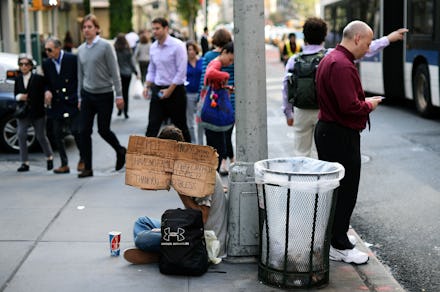One Chart Shows Just How Bad Inequality in the U.S. Has Become

The news: Income inequality in the U.S. is even worse than you think — and a new study suggests that it may be at its worst levels since before the Great Depression.
A new paper by the University of California, Berkeley's Emmanuel Saez and the London School of Economics' Gabriel Zucman analyzes the distribution of household wealth in the U.S. since 1913. Using an improved array of data sources, such as tax information, the study yielded astonishing new data. The 21st-century rich have gotten richer much more quickly than even previous critics like Capital in the 21st Century author Thomas Piketty realized. While the problem of income inequality has long been known, the new data show that so too has wealth inequality, that is, the value of everyone's holdings.
Their findings: Since the early 1980s and the tax-slashing Reagan administration, the share of wealth held by the richest Americans has once again reached levels not seen since before the Great Depression. Real incomes for the 1% have grown at a rate of 3.4% a year from 1986 to 2012, compared to just 0.7% for the bottom 90%. Increasing levels of debt, particularly in the housing sector, have contributed to the decline of most Americans.
In the early 1980s, the bottom 90% of Americans owned around 36% of the nation's wealth, about four times that of the top 0.1%. Now, the top 0.1% controls a total of 22% of all wealth — roughly the same as the bottom 90%. The tides have turned.
But the ultra-wealthy are doing even better than the rest of America's rich. Today the 16,000 families making up the richest 0.01% of Americans control approximately 11.2% of total wealth, the highest on record since 1916. While some of the new rich are getting wealthy through entrepreneurship and hard work, many of them are merely resting on inherited wealth. Either way, this new class of super-rich has no precedent in recent American history.
Why you should care: Survey data shows that average people consistently underestimate how bad income inequality is in their countries by huge margins, meaning that even those concerned about inequality are likely missing the full scale of the problem. As it is, the U.S. appears to be skyrocketing straight through Roaring Twenties-levels of inequality, and it's only going to get worse.
This week, the World Economic Forum's Global Agenda Councils released a report indicating that international experts now regard inequality as the top threat to the world in 2015, exceeding even unemployment and institutional failure. Majorities in all 44 nations polled by Pew rated inequality as a "big problem," with an additional 28 out of 44 judging it as a "very big problem." But it seems unlikely much will be done about it in the U.S. anytime soon, given a gridlocked government, an economic system gamed in favor of the rich and elections that now cost billions of dollars.